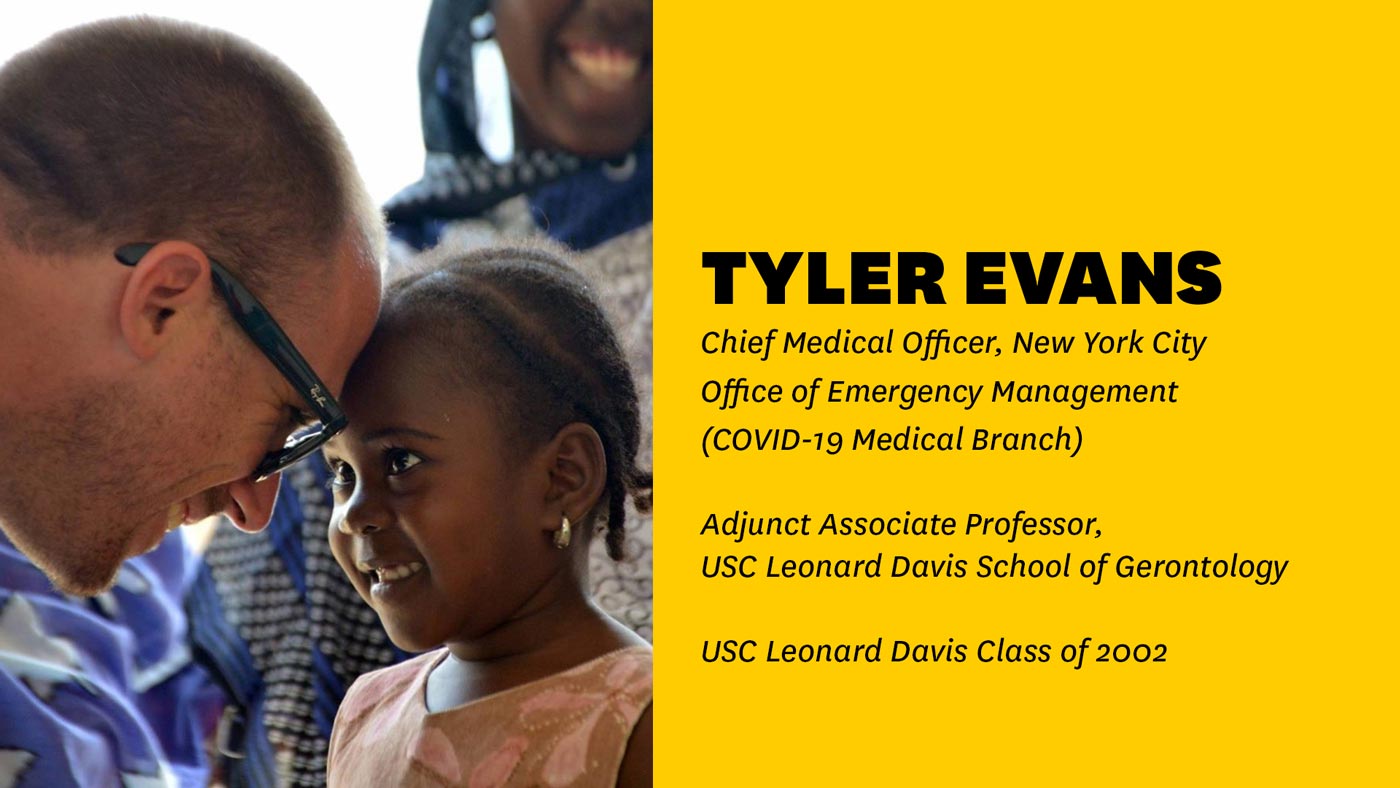Throughout his career, Dr. Tyler Evans ‘02 has been on the front lines of major disease outbreaks around the globe. He was in South Africa at the height of the AIDS crisis and he treated Ebola patients in Sierra Leone. He just joined the New York City Emergency Management Department as the chief medical officer for the COVID-19 branch.
The USC Leonard Davis School “Impact Maker” joined Professor John Walsh to discuss the current pandemic, global health, and how students can best serve populations in need. Here are highlights from what he shared:
On how we were not prepared for COVID-19
“Folks in public health, especially in the communicable disease world, knew that the greatest sort of threat to society was not necessarily going to be war; it was going to be a microbial onslaught. And if the infrastructure is there, I’m not saying it’s not bad, but the risk is definitely mitigated. And we were not there. I mean, we’re getting better now. but we were not ready.”
On health disparities and vulnerabilities
“When we look at variability, even between states and certainly even within states and within cities, and when you look at the granularity, you’re going to see a lot of differences, and those differences, I think, really highlight the disparities that naturally exist throughout this country.”
“I’m sitting here in a tennis field hospital with incredibly sick people, but they all have what we refer to it as the social determinants of health. They all have a number of chronic comorbidities. They’re people that historically don’t have a great access to healthcare. So there are a lot of factors involved that have led them to be more vulnerable for adverse consequences.”
“We can’t move forward in life being afraid to come outside. We can’t move forward in life being afraid to touch other people. I do think that the shelter in place measures were a good thing. I don’t think that we completely thought out all of the unintended consequences on the most vulnerable populations in the U.S. and abroad when it comes to food insecurity, when it comes to other kinds of chronic diseases or access to care.”
On how we are all in this together
“I think, hopefully, it’ll kind of bring us all together; more solidarity across the world to better understand that we are really all in this together. Despite the fact that the term is a little cliché, I think that if people really listen to what that means, they will grasp onto it and really understand how we focus so much on differences, but the reality is we really are all potentially impacted by this.”
On how students can help and find meaning in their work
“There are a lot of opportunities to get involved, not just for COVID, but for the prevention or management of other diseases. You don’t have to be a physician. You can be a student. But you’ve to find ways where your contribution is not just meaningful to you. I’ve had a number of really meaningful and translatable, sort of transformational experiences throughout my own life, but we also have to ensure that we’re giving back to society when we’re doing these internships or whatnot. So finding something that might not be as glamorous but could truly be meaningful and helpful is good. You might be having to create a database or code, or help to develop infrastructure. A lot of the developments are not as sexy and cool and exciting as people think they are. But all of those parts ultimately end up leading to our ability to save lives. So finding your niche, finding something that you’re really good at, and doing it, and contributing is important.”
“For the students that are watching this, it’s so important that throughout your career, whether it’s in medicine or public health, or whatever field you decide, to just try to really do the right thing. Try to lead your career with your moral compass and ultimately try to impact populations that need it the most. And I assure you that ultimately your lives, both professionally and personally, will be very rich and meaningful.”
“So the world needs you guys to help populations that are in need, whether it’s now, or whether it’s building it, or whether it’s in acute management. Like I said, it’s not just healthcare systems, it’s economics… there’s so many intersections in our globalized world. And as long as folks really lead with their moral compass, I think they’ll have a very meaningful life.”

